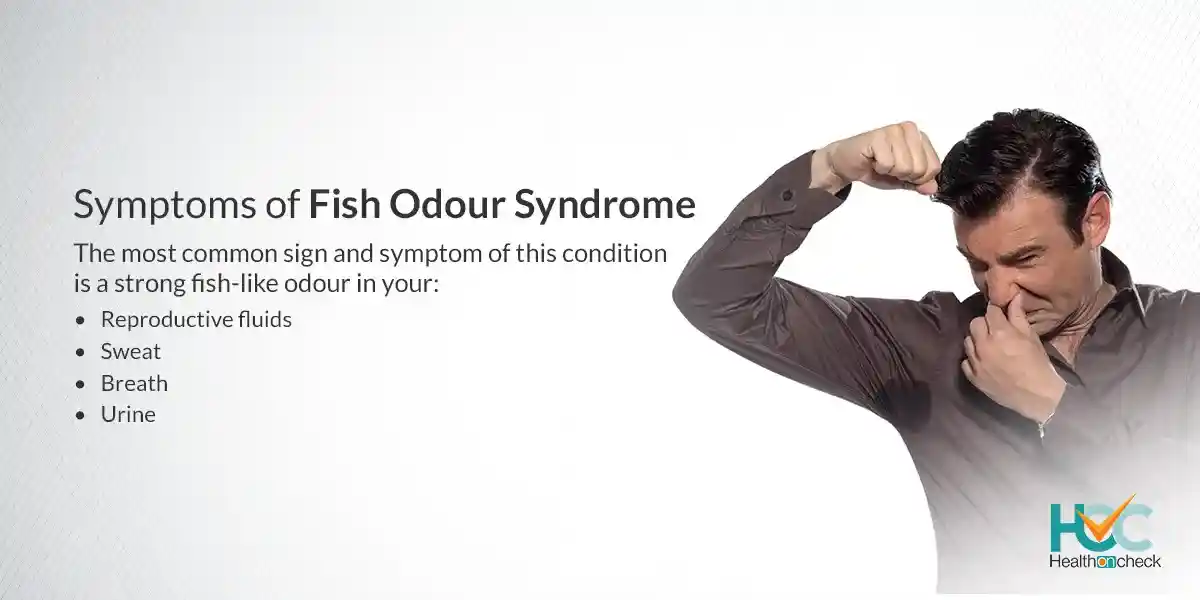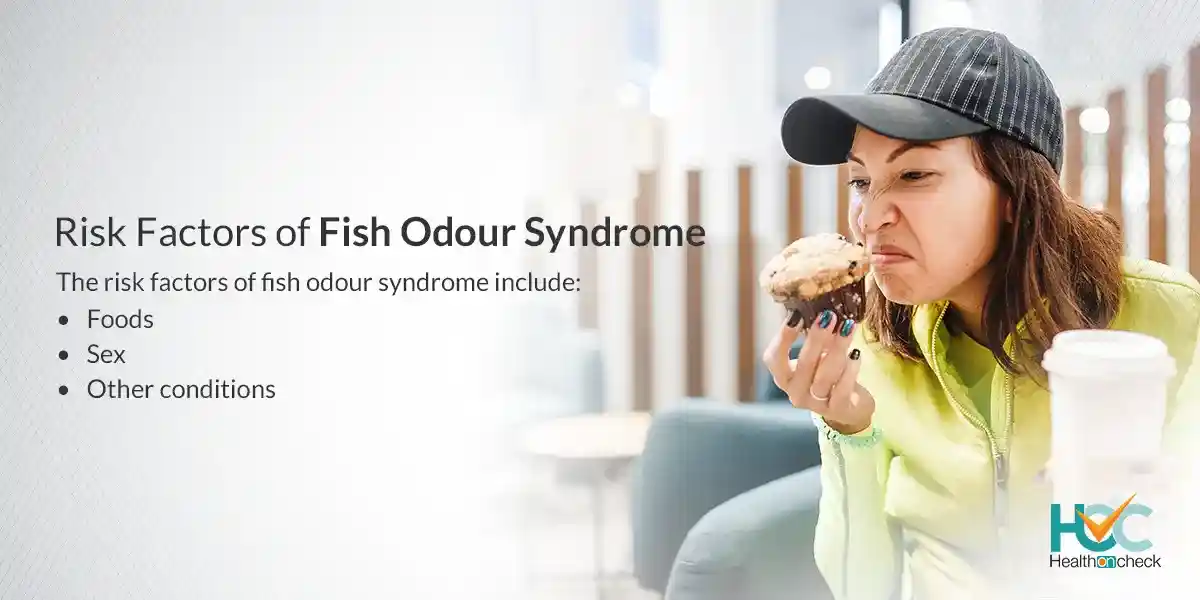All about Fish Odour Syndrome

What is Fish Odour Syndrome?
Fish odour syndrome, also known as trimethylaminuria, is a very rare disorder that makes your breath, sweat, pee, and saliva smell like rotten eggs or rotten fish. Some people have TMAU because of defective genes passed down from their parents affecting their metabolism. Some diseases and medications might lead to fish odour syndrome. This condition might not feel like a serious health issue, but people with it usually have to cope with psychological and social problems. Fish odour syndrome can’t be cured but changes in your diet, using specific soaps and lotions, and managing stress help decrease its symptoms.
What are the Types of Fish Odour Syndrome?
There are two types of fish odour syndrome including:
Primary trimethylaminuria: In primary trimethylaminuria, people get this condition due to an inherited metabolic condition that blocks the enzyme from breaking down trimethylamine. It occurs because of a few changes in the FMO3 gene that carries commands on producing the FMO3 enzyme. Without proper instructions, your body is not able to produce an effective enzyme.
All about Fish Odour Syndrome: In the case of secondary trimethylaminuria, people do have FMO3 enzymes, but something stops the enzyme from totally breaking down trimethylamine. Secondary trimethylaminuria might occur among people with liver failure or those who get choline supplements for treating Alzheimer’s or Huntington’s disease. Choline is an important nutrient which is found in meats, beans, fish, nuts, eggs and some vegetables.
What are the Symptoms of Fish Odour Syndrome?

The most common sign and symptom of this condition is a strong fish-like odour in your:
- Sweat
- Breath
- Urine
- Reproductive fluids
The odour may worsen with exercise or stress because these activities can increase how much you sweat.
What are the Causes of Fish Odour Syndrome?
This condition usually occurs because of mutations in the FMO3 gene.
Generally, FMO3 is the reason for the production of an enzyme that breaks down TMA into an odourless molecule. If this specific enzyme is not created or its activity is decreased, TMA can accumulate in the body. The extra TMA is then released through bodily fluids like sweat and urine.
Mutations to FMO3 are generally inherited in a recessive pattern, which means both parents are carriers of at least one copy of the mutated FMO3 gene. Carriers might show no signs and symptoms or show mild symptoms, or episodes of temporary fish odour.
Even without mutations to FMO3, a few people might experience fish odour syndrome after taking large doses of TMA or products that augment TMA production.
What are the Risk Factors of Fish Odour Syndrome?

The risk factors of fish odour syndrome include:
Sex: Women are more likely to develop this condition than men, but the reason for this is not clear. Scientists believe that female sex hormones, like oestrogen and progesterone, trigger the symptoms. The condition usually gets worse near puberty. Also, the symptoms may worsen after taking oral contraceptives before and during menstrual periods, and when women reach menopause.
Other conditions: Vaginal disorders, including trichomoniasis or bacterial vaginosis, might result in a fishy odour that is the same as that of TMAU. Some liver or kidney dysfunction may cause changes in body odour. Hepatic diseases, including hepatic enzyme deficiencies, or cirrhosis can lead to a fishy or ammonia-like body odour. Several metabolic conditions such as isovaleric acidemia, maple syrup urine disease, and phenylketonuria (PKU) may also manifest abnormal body odours.
Foods: Some specific foods, including seafood, may lead to transient body odour but this form of dietary-related odour is usually temporary and gets over once the food is removed from the diet. Getting a detailed dietary history and examining the relationship between food intake and the onset of symptoms might help differentiate between dietary-induced odour and TMAU.
What are the Complications of Fish Odour Syndrome?
People with fishy odour syndrome may suffer significant social and psychological issues. They might feel embarrassment, low self-esteem, and social isolation, because of the odour. They also have an increased risk of developing anxiety and depression because of social stigma. These psychological and emotional issues might affect relationships, employment opportunities, along the overall quality of life
How Fish Odour Syndrome is Diagnosed?
To diagnose this condition, generally, a urine test is performed. The urine of people with fish odour syndrome is tested to check for higher levels of trimethylamine. Testing might be performed by giving choline orally which is followed by collecting urine a specific number of times over 24 hours. Urine testing is performed on two separate occasions when the person is on a non-restricted diet. The test can measure the ratio of trimethylamine to trimethylamine N-oxide content in the urine.
TMA challenge” or a “TMA load” test can be performed to identify the carriers of this syndrome which involves giving a 600 dmg pill of trimethylamine (TMA) to a person suspected to be a carrier. The carriers excrete 20-30 percent of total trimethylamine as the free unmetabolized amine and the remaining as trimethylamine N-oxide. Non-carriers don’t excrete more than 13% of the dose as trimethylamine.
What are the Treatment Options Available for Fish Odour Syndrome?
At present there is currently no cure for fish odour syndrome but it is possible to lower the symptoms of odour:
You might be advised to avoid the following foods to reduce symptoms:
- Milk from wheat-fed cows.
- Eggs.
- Liver.
- Peas.
- Beans.
- Peanuts.
- Soya products.
- Brussels sprouts.
- Broccoli.
- Cabbage.
- Cauliflower.
- Seafood.
- Fish oil supplements.
Removing these items from your diet may decrease the amount of important nutrients such as choline and folate, so you should discuss with your doctor ways to make sure you get the required amount of choline and folate. Women who are pregnant or lactating should not eliminate foods containing choline and should discuss with their doctors the other ways they can minimise the symptoms of fish odour syndrome.
Your doctor might prescribe activated charcoal which should be taken at a dose of 750 mg for ten days two times daily. Copper chlorophyllin should be taken at a dose of 60 mg after meals for three weeks three times a day.
You can also use soaps with a moderate pH, between 5.5 and 6.5 which can help decrease the odour.
Taking riboflavin (vitamin B2) supplements can also be taken as they help to enhance any remaining FMO3 enzyme activity.
You should also avoid activities like exercise, stress, and emotional upsets to increase the amount of sweat production in your body.
You might be prescribed some doses of antibiotics to decrease your gut bacteria which can help to reduce the amount of trimethylamine in your gut. Your doctor might also refer probiotics to stimulate gut health and decrease the amount of trimethylaminuria.
Living with Fish Odour Syndrome
People with fish odour syndrome might go into self-imposed social exile because they believe their fishy-smelly symptoms might offend others. They may also believe that they are required to keep life at arm’s length even after they know how to manage their symptoms. Such people may feel angry, neglected, isolated, anxious, or depressed, and shall seek mental health support.
Whom To Consult?
Fish odour syndrome can’t be cured but it can be managed. Changing your diet and some personal habits can be helpful to manage the symptoms. If you take medications that cause this condition, ask your doctor about alternatives. If you notice a fish-like odour from your body, then consult your doctor who will diagnose your symptoms and start treatment accordingly.




